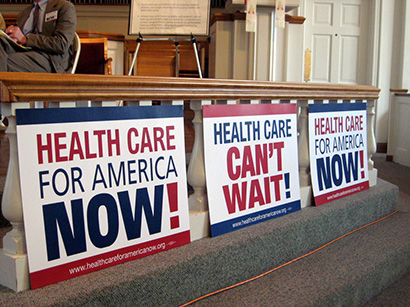
No state had more at stake than California, in last week’s Supreme Court decision upholding the Affordable Care Act.
No state has advanced as far toward putting the law into effect, and with nearly seven million lacking coverage, California is among the states with the highest percentage of uninsured. Only about half of Californians are covered through an employer, compared to 60 percent nationally.
In the spring of 2010, even while Republican Gov. Arnold Schwarzenegger was still in office, work started to get ready for the plan’s full roll-out in 2014. California was the first state to set up a Health Benefits Exchange where people could compare insurance options and access the federal financial subsidies that will help low- and moderate-income people pay for coverage.
Among benefits already in place:
- Over 400,000 people with low incomes who weren’t eligible for Medi-Cal (California’s Medicaid) are now covered by Low-Income Health Programs, run by counties with federal matching funds. They will be covered by Medi-Cal in 2014.
- More than 11,000 people denied coverage because of pre-existing conditions are already covered under a federally-funded Pre-Existing Condition Insurance Program. Insurers already must cover children regardless of pre-existing conditions; in 2014 this provision will extend to everyone.
- Over 350,000 young adults up to age 26 are insured through their parents’ coverage.
More than two million more Californians can be covered in 2014 under expanded Medicaid. At the start, the federal government will cover all costs; federal funding will later drop to 90 percent.
Overall, it is estimated that between half and two-thirds of currently uninsured Californians will be covered through the ACA. The program has already brought the state billions to help set up the exchange; it is expected to bring the state some $15 billion in federal funds each year.
“Clearly, our large uninsured population will in 2014 have many more options available for getting coverage, which should be much more affordable for low-income people than it is today,” Marian Mulkey of the California Health Care Foundation told a June 29 special broadcast over public radio station KQED. “And all of us who have insurance today but may lose it tomorrow will be in a more stable and secure position.”
Ellen Wu, executive director of the California Pan-Ethnic Health Network, expressed support for the court’s decision “to uphold a law that has already had such a positive impact on our communities,” and pointed out that over two-thirds of those in the state’s Low-Income Health Programs are people of color.
Observers also pointed out that even when the ACA is in full operation, much remains to assure quality affordable coverage to everyone.
SIREN, the Services, Immigrant Rights and Education Network, which serves immigrants in the San Francisco Bay Area, said the court’s decision “reaffirms the government’s commitment to improving the lives of American families,” but expressed concern “that undocumented immigrants continue to be excluded from health care reform.” SIREN said over one million undocumented Californians will remain uninsured under ACA, while recent legal permanent residents will have to wait five years to be covered.
Advocates of Medicare for All are vowing to continue their efforts to ultimately win a single payer system of health coverage. National Nurses United praised expanded Medicaid coverage and increased funds for community clinics, but pointed out that the ACA doesn’t really limit how much insurers and providers can charge, and expands the “profit-driven insurance system” by requiring the uninsured to buy private insurance.
“Of course, the law is not an extension of Medicare for all, nor does it guarantee health care for all tomorrow. Those struggles are still ahead of us,” John August of the Coalition of Kaiser Permanente Unions, wrote on the California Labor Federation’s web site. “But advocates for high-quality health care for all have been given a huge boost to build on the platform of the Affordable Care Act.”
Photo: http://www.flickr.com/photos/progressohio/ / CC BY 2.0












Comments